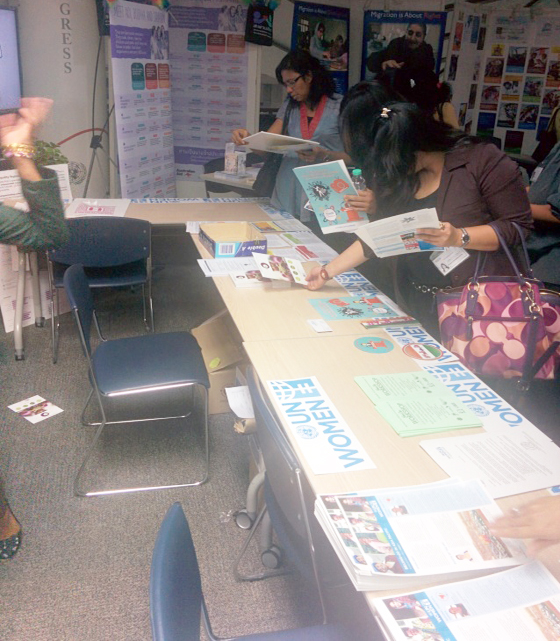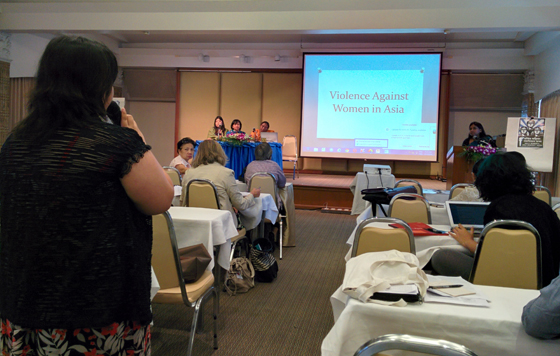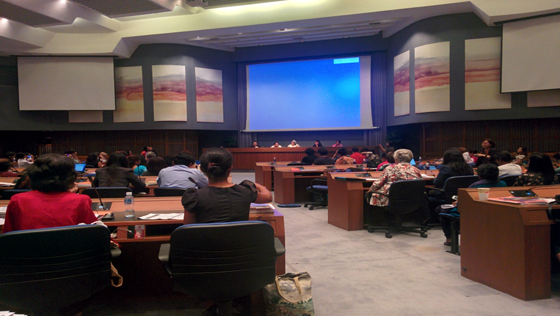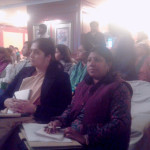The Beijing+20 regional review process for the Asia Pacific region called for a conference of civil society members and the key stakeholders to the ‘Asia Pacific Civil Society Forum on Beijing+20’ held in Bangkok from 14th – 16th November 2014.


Mr. Amitabh Kumar and Ms. Anubhuti Vatsayan represented Centre for Social Research at the conference and gained insights of the feminist movements from across the globe. The conference also highlighted the achievements, struggles and engagement of the women’s movements in the last 20 years as a part of the Beijing Platform for Action process.
The event witnessed the presence of eminent speakers like Ms. Ravadee Parasertcharoensuk (Sustainable Development Foundation), who inaugurated the conference and Ms. Kate Lappin (Asia Pacific Forum on Women, Law and Development).


A video presentation took the audience through the journey of feminist movements and women’s rights milestones in the last 20 years.
Beijing and Beyond , a session in the conference contextualizes the Beijing Platform for Action, the relevance of its review and the linkages to Post 2015 development agenda.


Post this, the conference had three plenary sessions scheduled:
Session 1: Our Lives 20 years On
This session provided testimonials from women whose struggles against human rights violations are emblematic of the struggles across the region. The testimonials highlighted the progressive movements women have ignited as a result of their experiences and struggles.
Session 2: Our Lives 20 years On – The Continuing Struggle of Women in Achieving Development
The session focused on the economical, political and cultural structures that have prevented the realization of the promise of Beijing and consider the issues still missing from that agenda and emerging concerns that are critical in achieving women’s Human Rights.
Session 3: Accountability and Implantation of BPfA, Post 2015 and the SDGs
The Speakers in this session presented the current review process and intergovernmental meeting for increasing genuine accountability. It included an introduction to the mapping of existing accountability and monitoring mechanisms and link to Post 2015 agenda, and the sustainable Development Goals (SDGs).
The second day of the conference was based on self organized workshops. The team from CSR attended the following Thematic Workshops:
Session 1 VAW in Asia: Stories from the region.
Session 2 Advancing Rights of Women in Asia through access to rightful information
Session 3 Women in Power
Session 4 CSO caucus (regional)
In the last session, which was a caucus meeting of the Indian Civil Society Organizations, the following was discussed.
Points for consideration from India Civil Society:
- Women in political and economic decision-making: equal and meaningful participation in governance with proportional electoral reforms or 50 percent representation in all government bodies – parliament, assemblies, land and revenue administration and district level governance. Educate girls and women in new technologies and management skills
- Women and Economic Empowerment: In reducing poverty and social, gender and economic inequalities distribution of agricultural land in rural women names. Gender based wage parity and maternity benefits in both public and private sectors. Creation of employment opportunities with attention to dalit, tribal and other minorities.
- Formulate and implement a national plan of action to address all forms of violence against women and girls in private and public spheres with attention to aggravated forms of violence in caste – armed conflict situation, tribal, dalit and religious minorities. Also eliminate gender based violence and harmful practices including child and early and forced marriage and honor killings.
- Ensure that all women and girls can exercise the rights to a full range of quality, free, and comprehensive sexual and reproductive health information and service provided through the public and private sectors, without any form of stigma and discrimination, coercion or violence.
- Allocate adequate finance to ensure the availability, acceptability, accessibility and quality of services and adopt mechanisms for accountability that including regular monitoring redress mechanisms for violations.
- Engaging with Civil Society; especially women’s organization in planning, implementation and monitoring of policies and programs




